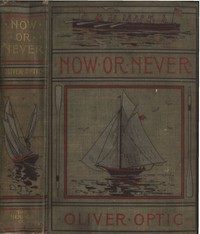Poor and Proud; Or, The Fortunes of Katy Redburn: A Story for Young Folks, Optic [best books to read now txt] 📗

- Author: Optic
Book online «Poor and Proud; Or, The Fortunes of Katy Redburn: A Story for Young Folks, Optic [best books to read now txt] 📗». Author Optic
"I'm going to support my mother, and I have no right to be proud. If I meet my grandfather, I should like to sell him twenty sticks of candy."
"Hallo, Katy! What are you going to do?" said a voice behind, which she recognized as that of her friend Tommy Howard.
"I'm going to sell this candy," replied Katy.
"You're a spunky one; mother told me all about it. I should like two sticks," said Tommy, as he offered her the money.
"Take two, Tommy, and as many more as you like."
"Two is all I want;" and he placed the two cents on the tray.
"No, Tommy, I won't take your money," replied Katy, with a blush, for she felt ashamed to take his money.
"That's no way to trade," laughed Tommy. "You won't make much, it you do so. Keep the money and I will keep the candy."
"I can't keep it, Tommy."
"You must; if you don't take the money, I won't take the candy."
"I owe you two cents, Tommy. I will pay you now."
"No, you don't!"
"Please to take them; I shall feel very bad, if you don't."
Tommy Howard looked her in the eye a moment; he saw a tear there. Her pride was wounded, and he took the two cents from the tray, for he did not wish to give her pain.
"Now, we are square, Tommy," said Katy, as her face brightened up again.
"Yes, we are, but I don't like it pretty well. One of these days, when you get out of this scrape, I will let you give me as much candy as you have a mind to."
This was very obliging of Tommy; and when Katy understood his motive, she was sorry she had not permitted him to pay for the candy, for she saw that he did not feel just right about the transaction. It was not exactly mercantile, but then the heart comes before commerce. As she walked along, she could not help thinking that her natural generosity might seriously interfere with the profits of her enterprise. She had a great many friends; and it became a knotty question for her to decide whether, if she met any of her school companions, she should give each of them a stick of candy. She would like to do so very much indeed; but it was certain she could not afford to pursue such a liberal policy. It was a hard question, and, hoping she should not meet any of her schoolmates, she determined to refer it to her mother for settlement.
When she got into Washington Street, she felt that the time for action had come. Now was the time to sell candy; and yet she did not feel like asking folks to buy her wares. The night before, as she lay thinking about her business, it had all seemed very easy to her; but now it was quite a different thing. No one seemed to take any notice of her, or to feel the least interest in the great mission she had undertaken. But Katy was aware that it requires some effort in these days to sell goods, and she must work; she must ask people to buy her candy.
There was a nice-looking gentleman, with a good-natured face, coming down the street, and she resolved to make a beginning with him. He couldn't say much more than no to her, and she placed herself in a position to accost him. But when he came near enough, her courage all oozed out, and she let him pass without speaking to him.
"What a fool I am!" exclaimed she to herself when he had passed. "I shall never do anything in this way. There comes another gentleman who looks as though he had a sweet tooth; at any rate, he seems as good-natured as a pound of sugar. I will certainly try him."
Her heart pounded against her ribs as though it had been worked by a forty-horse engine—poor girl. It was a great undertaking to her; quite as great as taking a six-story granite warehouse, piling it full of merchandise from cellar to attic, and announcing himself as ready for business, to a child of a larger growth. Everything seemed to hang on the issues of that tremendous moment.
"Buy some candy?" said she, in tremulous tones, her great, swelling heart almost choking her utterance.
"No, child. I don't want any," replied the gentleman, kindly, as he glanced at the tray on which the candy had been so invitingly spread.
"It is very nice," stammered Katy; "and perhaps your children at home would like some, if you do not."
Bravo, Katy! That was very well done, though the gentleman was an old bachelor, and could not appreciate the full force of your argument.
"Are you sure it is very nice?" asked the gentleman, with a benevolent smile, when he had laughed heartily at Katy's jumping conclusion.
"I know it is," replied the little candy merchant, very positively.
"Then you may give me six sticks;" and he threw a fourpence on her tray.
Six sticks! Katy was astonished at the magnitude of her first commercial transaction. Visions of wealth, a fine house, and silk dresses for her mother and herself, danced through her excited brain, and she thought that her grandfather, the great Liverpool merchant, would not have been ashamed of her if he had been present to witness that magnificent operation.
"Have you any paper to wrap it up in?" asked the gentleman.
Here was an emergency for which Katy had not provided. Her grandest expectations had not extended beyond the sale of one stick at a time, and she was not prepared for such a rush of trade. However, she tore off a piece from one of the white sheets at the bottom of the tray, wrapped up the six sticks as nicely as she could, and handed them to the gentleman, who then left her to find another customer.
Katy, elated by her first success, ran home as fast as she could to procure some more white paper, of which she had a dozen sheets that had been given her by a friend. It was in the back room, so that she did not disturb her mother, choosing to astonish her with the whole story of her success at noon.
CHAPTER VIII. KATY SELLS OUT AND VISITS THE MAYOR.
Katy reached Washington Street once more. She had lost all her timidity, and would not have feared to accost the governor, if she had met him, and request him to purchase a cent's worth of molasses candy.
"Buy some candy?" said she to the first person who passed near her.
"No!" was the prompt and emphatic answer of the gentleman addressed.
"It is very nice," suggested Katy.
"Get out of my may," growled the gentleman, and the little candy merchant deemed it prudent to heed the command.
She was nettled by this rude reception, and would have been disposed to resent it, if there had been any way for her to do so. She had not yet learned to bear up against the misfortunes of trade, and her eye followed the sour gentleman far down the street. Why should he treat her in such a rude and unkind manner? What would he say if she should tell him that her grandfather was a great Liverpool merchant, lived in a big house, and had lots of servants to wait upon him? She was as good as he was, any day.
"Give me a stick of candy," said a nice little girl with a silk dress on, whom a lady was holding by the hand, at the same time placing a cent on her tray.
Katy started at the words, and reproved herself for her want of meekness. She might, perhaps, have sold half a dozen sticks of candy while she had been watching the sour gentleman, and persuading herself that she had been very badly used. She tore off a piece of paper, in which she wrapped up the candy for the purchaser, and handed it to her.
"Thank you," said she, as she picked up the copper, and transferred it to her pocket.
"Your candy looks very nice," added the lady evidently pleased with Katy's polite manners.
"It is very nice, ma'am."
"Have you sold much to-day?"
"No, ma'am; I have but just come out."
"It looks so good, I will take half a dozen sticks for the children at home."
"Thank you, ma'am; you are very kind," replied Katy; and her nimble fingers had soon made a nice little parcel for the lady, who gave her a fourpence.
Here was another avalanche of good fortune, and the little candy merchant could hardly believe her senses. At this rate she would soon become a wholesale dealer in the article.
"Buy some candy?" said she, addressing the next person she met.
"No."
"Buy some candy?" she continued, turning to the next.
"No."
And so she went from one to another, and no one seemed to have the least relish for molasses candy. She walked till she came to State Street, and sold only three sticks. She begun to be a little disheartened, for the success she had met with at the beginning had raised her anticipations so high that she was not disposed to be content with moderate sales. While she was standing at the corner of State Street, waiting impatiently for customers, she saw a man with a basket of apples enter a store. She crossed the street to observe what he did in the store, in order, if possible, to get an idea of his mode of doing business. She saw him offer his apples to the clerks and others in the shop, and she was surprised and gratified to see that nearly every person purchased one or more of them. In her heart she thanked the apple man for the hint he had unconsciously afforded her, and resolved to profit by his example.
Now that commerce was her business, she was disposed to make it her study; and as she reasoned over the matter, she came to understand why she found so few buyers in the streets. Ladies and gentlemen did not like to be seen eating candy in the street, neither would many of them want to put it into their pockets, where it would melt and stick to their clothes. They would eat it in their shops and houses; and with this new idea she was encouraged to make a new effort. Walking along till she came to a store where there appeared to be several clerks she entered.
"Buy some candy?" she said, addressing a salesman near the window, as she raised up her ware so that he could see them.
The clerk made no reply, but coming round from behind the counter, he rudely took her arm, opened the door, and pushed her into the street. Katy's cheek burned with indignation at this unprovoked assault, and she wished for the power of ten men, that she might punish the ill-natured fellow as he deserved. But it was all for the best, for, in pushing her out of the shop, the clerk threw her against a portly gentleman on the street, whose soft, yielding form alone saved her from being tumbled into the gutter. He showed no disposition to resent the assault upon his obesity, and kindly caught her in his arms.
"What is the matter my dear?" said the gentleman, in soothing tones.
"That man pushed me out of the store," replied Katy, bursting into tears, for she was completely overcome by the indignity that had been cast upon her.
"Perhaps you didn't behave well."
"I am sure I did. I only asked him to buy some candy: and he shoved me right out the door, just as though I had been a dog."
"Well, well, don't cry, my dear; you seem to be a very well-behaved little girl, and I wonder at finding you in such low business."
"My mother is sick, and I am trying to earn something to support her," sobbed Katy, who, with her independent notions of trade in general, and of the candy trade in particular, would not have revealed this humiliating truth, except under the severe pressure of a wounded spirit.
"Poor child!" exclaimed the portly gentleman, thrusting his hand deep down into his pocket, and pulling up a handful of silver. "Here is half a dollar for you, for I know you tell the truth."
"O, no, sir; I can't take money as a gift."
"Eh?"
The gentleman looked astonished, and attempted to persuade her; but she steadily protested against receiving his money as a gift.
"You are a proud little girl, my dear."
"I am poor and proud; but I will sell you some candy."
"Well, give me half a dollar's worth."
"I





Comments (0)